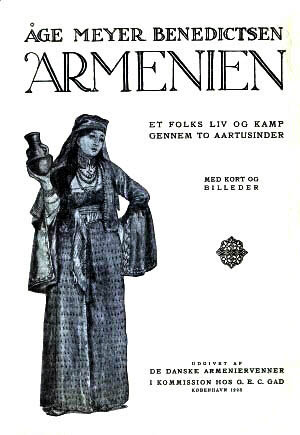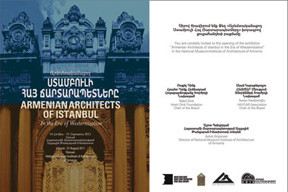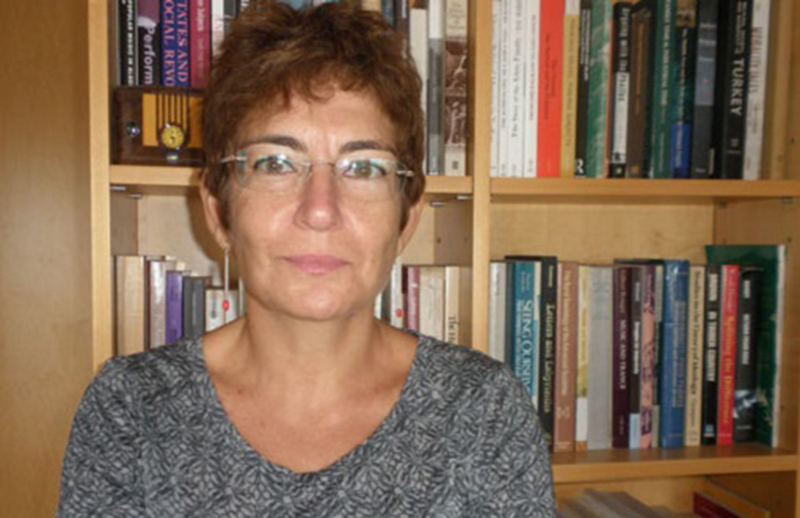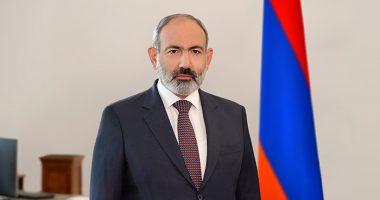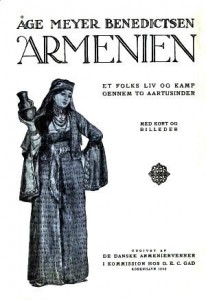

Introduction
The following is a handwritten account in Danish found in an exercise book in the archives of the Danish missionary organization Women Missionary Workers (Kvindelige Missions Arbejdere; KMA). The exercise book contains several other detailed survivor accounts or testimonies, all written down by Karen Marie Petersen, Danish KMA missionary in Mezreh (Mezereh, Mamouret-ul-Aziz, Elazig), Anatolia, the Ottoman Empire, during or immediately after World War I and the Armenian genocide; the handwriting, for instance, matches that of signed letters and postcards. More of these accounts will be published here. The narrator of the present account about the trials and tribulations of Digin Versjin is also in all likelihood Petersen. Furthermore, the account is likely to have been written down in a hurry relatively shortly after the events described therein – note, e.g., the somewhat ‘messy’ use of past and present tense and the abrupt ending. Perhaps for the same reason, the account also contains a number of typos, etc., so the translation has been silently and carefully edited for spelling and style.
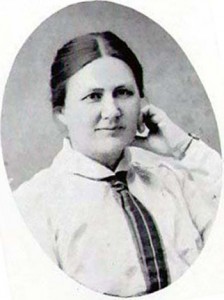

Who was Digin Versjin, then? The Armenian word ‘Digin’ translates into ‘Mrs.,’ or, more broadly, ‘the female head of the household,’ at times apparently roughly connoting something like ‘Lady.’ Digin Versjin was in fact member of the local Armenian ‘elite’ in the Mamouret-ul-Aziz region. In the sources that I have seen not many other Armenian women are referred to as ‘Digin’ by European and American missionaries (let alone by Armenians or Turks), so she must have been perceived to be something out of the ordinary. Digin Versjin, a.k.a. Vergene, was originally from Adana, Cilicia, as mentioned by U.S. missionary Tacy Atkinson in her published Harput diaries from before and during the Armenian genocide. The following diary entry is dated 20 July 1916; it is basically a brief summary of Digin Versjin’s life and fate:
I have been to call on Digin Vergene this morning. Her husband was a man of some wealth. Twenty five years ago he went to America and became a citizen, then he went to Liverpool ten years ago and married this girl from Adana. He retained his American citizenship but just before the war he with his wife and children returned here, and he took again his Turkish citizenship in order to regain some property here. Then the war came on and he lost his right of American protection. Last July he was sent in the ‘Sevkiat’ [‘deportation,’ MB] with his wife and children. He was delivered into the hands of a powerful Kurd whose men were sent to do the killing. This man was taken from the araba [a horse- or oxen driven carriage, MB] and killed before the eyes of his wife and children.
The Kurd saw the wife who is a pretty woman. He took her to his home and wanted to marry her, but his own wife made such a fuss that he soon decided not to marry her. She also refused to marry him, but she was in his power and was not allowed to go out. She soon became pregnant. In May he offended the Vali [Sabit Bey, MB] and was put in prison. Then her baby was born, she begs him to let her go as she will not marry him, but he refuses, says he loves her. When her baby was born he sent her money from the prison but it never reached her. She was almost starving. Now his brother has come and given her money for food. She wants to run away as he comes out of prison in ten days. She seems a beautiful Christian. She has her English Bible and hymn book. She has well to do relatives in America who would help her if they knew. Her body has suffered every shame but her soul is untouched.
It is no coincidence that Karen Marie Petersen, like Tacy Atkinson, would take a particular interest in a woman like Digin Versjin and the fate she met. A well-educated, Protestant Armenian woman could not help but attract the attention and sympathy of Western missionaries, especially in a rather small, provincial town such as Mezreh. Petersen, though, records her encounters with Versjin in much more detail than does Atkinson. From a scholarly point of view, it is notable that Petersen’s written account does not contradict that of her American missionary colleague. Rather, supports it and adds depth, nuances, as well as context to it. It is, in my opinion, an important early account of, for instance, life as an Armenian woman in captivity in what was commonly referred to at the time as a Muslim Harem; of missionary encounters with and perceptions of ‘the Other,’ as academic lingo critical of the Orientalist persuasion will have it; and of center-periphery dynamics, more precisely about Hadji Raja, an important local genocide perpetrator, his role in the extermination of the Armenians, and how he would fall in and out favor with Ottoman regional and central authorities (see also discussion in endnote 6). In Karen Marie Petersen’s words:
“Digin Versjin. One of the most pleasant women! A Madonna-like beauty; a quiet, modest woman and a true Christian believer. For seven years she and her husband had lived in Liverpool, and they had now come to the husband’s home in Mezereh. The home [had] a certain European character, they were rich and she had many pieces of jewelry and even a piano. There was a little 7-year old girl. The husband and his family were Catholics, while she, who as a young girl had attended the college in Adana, was a Protestant.
1 July 1915, they had to watch the destruction of this home and the scattering of their belongings in all directions, and they themselves became refugees. They were, together with the Catholic congregation, the first group that left Mezereh. They had been promised special protection by the Vali. When the convoy of carriages left Sevang the next day, the Kurds fell over them, separated the men, and chopped them down. Her husband ran to the carriage and sat down next to her, probably hoping to be in hiding, but the Kurdish chief, Hadji Raja, came and dragged him out of the carriage and killed him right before her eyes. Then he took Digin Versjin and all her belongings back to Sevang and demanded that she should become his. The other women were plundered too, even the novices, and they were stripped and abducted.
This man, then, took her and the little girl to a house in the town. I heard about this, found the house, and tried to get to speak to her (on August 1 [1915]). I had to knock on the door in vain for a long time; finally she came and opened the door herself. It turned out that we could not enter and that she was only allowed to speak a few words with us. This was because the Kurd was home, [he] had been on a trip to Istoli [sic: Isoli] (naturally to direct the killings there.) He has his home in Istoli, has [a] wife and children, and now this lovely young woman has to live as his wife. She has told him that she will not abandon her faith, and she has her Bible which she reads and takes comfort in. She also has the little girl; when the Kurd calls at her – the child says, ’I will not come to you, you have killed my father.’ Can anyone understand how it has been for such a sensitive lady to be a prisoner in the house of such a man?
During the winter he brought his Kurdish wife and children from Isoli and this was the greatest humiliation, having to live together with this woman who naturally disliked her. She had to see all her jewelry in the possession of this wife, but one day, when [the Kurdish wife] took out the jewelry, something must have touched her heart, and she gave the little girl two sparkling gems to use as earrings! But the Kurdish family travelled back to Isoli and the husband persuaded Digin Versjin to travel with them to that home, something she adamantly refused.
At the end of May [1916], she gave birth to a little girl. The husband was in prison at the time as he had slandered the Vali to Enver Pasha. He was imprisoned here [‘here’ most likely meaning Mezreh, MB] for several months, but during this time he had gotten his 2 brothers to watch Digin Versjin so that she would not run away. But he did not give her enough to eat – she sold as many as possible of her clothes to buy more food, but she did not have milk for the child who cried because of that. She had an elderly Armenian woman to help her doing the housework, and she stuck to her with a touching devotion. She came to me in tears and told about Digin Versjin’s unhappy condition. I then visited [Versjin] and gave her money for milk and nutritious items, but I could sense that it was difficult for her, who had been rich and [one illegible word], to receive them. It was wonderful to see that despite her hard fate she had not lost her faith in God’s love, but was reading the Bible and praying all day long. She hoped that God would give her an opportunity to escape, but she had no friends who could hide her. We read and prayed together that God would show a way.
By the end of September, I was once again very worried about her condition. The Kurd had got out of jail, and because of a hostile relationship with the government, he was in a difficult position. [Note in original text: ‘*The government demands some money he owes because he had controlled the ferry service and the mail service.’]. His family in Isoli tried to persuade him to get rid of Digin Versjin and take care of them instead. Digin V. herself has no greater wish than to be free, but even though he, too, has reasons to wish to be free, he cannot let go of her. He does not want her to fall into the hands of another Turk [sic] or maybe to suffer want. Whether these are just empty words, or whether he really means it, I do not know. I could imagine that she by her quiet and mild ways has influenced him in a good way, and that true devotion and love has found a place in his evil and cruel heart. As a solution she proposed to travel to Aleppo where she has an aunt; at first he rejected it, but afterward he accepted this with such an eagerness that she became suspicious and began to believe that he was thereby planning something: namely to have her attacked and killed on the road. This way she would not later be able to call him to account for his evil deeds toward her, or for her money and jewelry that he had acquired.
We were leaning toward believing that he would have her done away with, and thought it to be the right thing to do if she escaped from him. We managed to find a woman in Harput, poor and insignificant, who would hide her, and, as Digin V. was not familiar with the road up there, she was to be disguised, and I should escort her. It had been planned where I should meet her, and the date had been decided upon (9 September [1916]), and I was tensely awaiting her at the appointed time, but she did not come. She had not dared to escape after all, not because she feared for herself, as no price could be too high for her to pay to get out of his hands, but she feared for the person who was willing to hide her.
It turned out that she had told the Turk [sic] that she would walk out herself, he did not have to worry about her anymore – but then he had said – ’Do not think about leaving or hiding. I will find you even if I have to burn down the whole town – and pity the person in whose house I find you.’ After this threat Digin V. would rather wait and see if she could make him let her go voluntarily.
But this period of waiting was hard and nerve wrecking. One evening in early October the Kurd gets home late and the male servants who slept on the ground floor were asleep and did not open for him. The old woman walks down and opens the door, but, furious about having to wait, he takes the old woman, puts her outside, and locks the door. She knocks on the neighbor’s door, and the neighbor lets her in. Digin Versjin was beside herself, fearing that something should happen to the woman, and the husband then says that she had to go down there herself and let her in, but she feared that someone would stand outside to kill her.
The next day she is beside herself, the child is troubled and uncared for, and the Kurd regrets to have thrown the old woman out and tells her to come back. She is scared, too, but finally complies for the sake of her Lady. But she [i.e., Versjin, MB] is so shocked that she starts at the slightest sound, thinks she is being followed – sees men come who want to tie her up and take her away. The old woman comes and asks me to come and help. I went there, and as long as I stayed there she was calm, but she looked very pale and had a frightened look in her eyes. I understood that things would go wrong if her surroundings did not change and suggested to her (albeit with a pounding heart) that I should talk to the Kurd to see if he would not allow her to come and visit me for a while. I then waited for some time while she filled his big leather belt with cartridges, as he was about to travel to Isoli. She was not to be alone in the house, though, as his 2 brothers were coming to watch her so that she could not escape. He did not come and I had to go home.
The next day, 6 October, around noon, I went there once more. Digin Versjin had neither eaten nor slept, but had spent the whole night by the window: ’to make sure that no one would come to kill her.’ I sent a message to Hadji Raja asking for a conversation with him. And he answered ’yes, if I would excuse him that he was not dressed.’ I answered that this meant nothing and went in with an Armenian woman as interpreter. I had expected to see an old, bearded man with a wild and sinister look, and that I would have to salute in a Turkish manner (bending the hand toward the chest and the forehead). I am very surprised to see a youthful man with a sturdy figure, beautiful facial features, and well-dressed, who jumps up from the divan and politely shakes my hand and asks me in the kindest way to take a seat. I then explained to him that I had a request which I hoped he would not decline, and told him that I had been there yesterday and had seen how bad a condition that Digin V. was in. She must have become afraid of something and had quite clearly lost her mind, something he himself had witnessed. As I cared about her a lot, and as it saddened me to see her in such a condition, I wanted to ask if she could stay at my place for a while. It was necessary that she had a ’change of air.’
But he did not think that there was any reason for being anxious about her condition; he had, though, been willing to call a doctor, something she did not want. It was a pleasure for him to hear my offer, but he could not oblige me as their laws forbade them to let their wives visit a stranger’s house. Think of what his friends would say, think of what people would say if they heard that his wife had gone to another house. Unfortunately, it was completely impossible. I discussed this with him at length and he finally said that she was allowed to walk around as much as she wanted to and to visit me every day, but she had to come home at night. I said that I could not believe this, I knew that she had been locked up completely until now and that was not enough anyway, she was very ill and had to get away completely. ‘Yes, but what would people say?’ It was shameful for such a great man when people talked about his wife! I said, ‘let people say what they want.’ It must be done for her sake, and I promised to take good care of her. Finally he said that he would have to think about it and give me an answer tomorrow, but if he was to say yes it was only for my sake. (A favor granted to me). I thanked him and politely bid him farewell.
When I went in to Digin V. and also met our Bible woman there, I said: ’Now is the time to pray that he is moved to take this step which is so difficult for him.’ I was already convinced, though, that the answer would be favorable. But still I had not expected it to come that soon. Shortly after I had gotten home, Digin Versjin arrived with Mary and the little girl. He had said, ’you can go today and stay for 14 days. Hurry up before I regret it.’ And now the wonder had actually happened; she, who had up until now been held as a slave and jealously guarded, was in our house now, free from the surroundings that were so dreadful to her. The Lord had worked this wonder in front of our eyes.
Already within the first days the ’change of air’ turned out to be beneficial. Digin V. slept at night and started to eat. Unfortunately, I could not refuse to receive the Kurd’s visits, but [I] stayed in the room while he talked to her. He said that he regretted having sent her here, because now she probably would not come back anymore. He had to travel to Isoli as his wife was lying ill there. (6 months ago she had a son and he had not been there yet. The wife and her brothers were of course angry about this insult and the brothers threatened to kill him). On the other hand he could not live without Digin Versjin. He explained to me that he had to have a wife where he was, one in Mezreh and one in Isoli! He was very agitated and his mind was divided, making him say the most contradictory things: If you want to stay, then stay and at the next moment ’I regret not having killed you, you have gotten me into a real mess,’ and that all the people in the village would say that it was great shame for him that his wife had run from him. I said that I thought that he should go to Isoli and stay there with his real wife and children who probably needed him, and when I was called out for a moment he said to D. Versjin: ’She probably wants me to leave so that she can take you to Dersim [Tunceli].’ (Over the border to a Kurdish tribe and from there to Russia).
Finally, on 16 October [1916], he left for the village and we were breathing more freely. Here, he got into a mighty fight with the family. The 5 brothers could not agree on matters of their property and their part of the looted goods, but they were mainly angry with him because he had not divorced [or: ‘gotten rid of’] Digin V. Already after 5 days he returned to sell his belongings and dissolve the household in Mezereh. He sent for Digin Versjin and set her free completely and allowed her to take whatever she wanted of the kitchen utensils. And she took a couple of boilers. It was a joyful day for all of us and I now felt that I had been released from my promise to look after her and hoped that getting her to Dersim would be successful. ’The Lord releases the bound and sets the prisoners free.’
Times of tribulation returned, though. Not more than 14 days later the Kurd returned from Isoli and wanted her back, claiming that he had never set her free. It so happened that the Kurd had found out that before the departure [i.e., the July 1915 ‘deportation,’ MB], Digin V.’s husband had deposited a large sum in the bank, and the Kurd had not yet gotten hold of this sum. As he wanted to have it paid out to him, and the government heard that Digin V. was no longer with him, they refused to give it to him. Now it was important for him to prove that she had only been away on a visit.”
According to the sources available to me, no more is known about the fate of Digin Versjin. She would appear to be but one of the tens of thousands of Armenian women ‘absorbed’ into Muslim households during the Armenian genocide.

